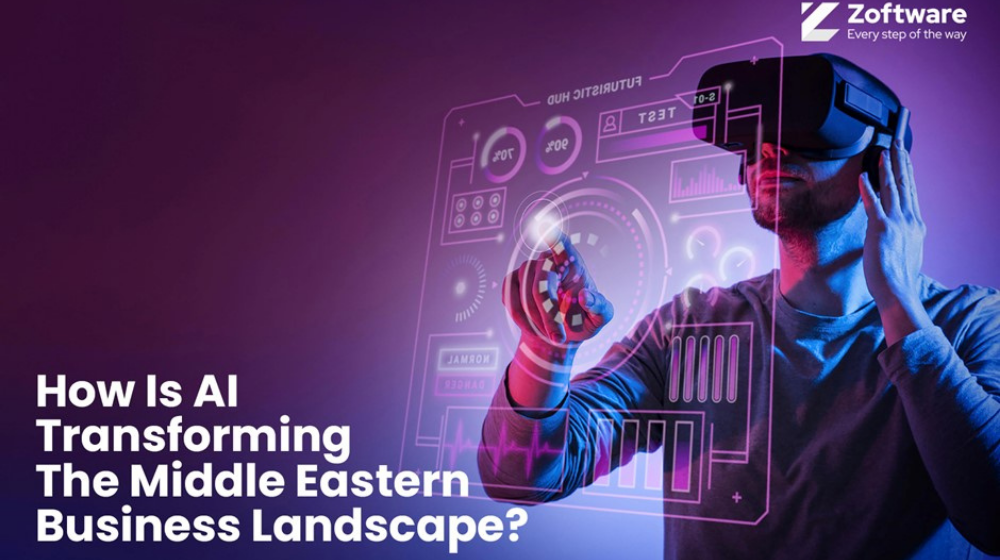The rapid digitalization, especially in countries like the United Arab Emirates and Saudi Arabia, has led to a surge in connected devices across the region. With vast amounts of data being generated, there’s an increasing need for automation to extract critical insights. For businesses worldwide, AI emerges as the definitive answer to this escalating challenge.
The fourth industrial revolution is here, and AI is at its forefront. For the Middle East, the stakes are high. Global trends indicate a massive shift towards AI and advanced tech. The data speaks volumes: Recent data from PwC states that by 2030, AI is set to bring in 2% of global benefits to the Middle East, amounting to US$320 billion. Specifically, Saudi Arabia is looking at AI contributions of over US$135.2 billion, or 12.4% of its GDP. The UAE isn’t far behind, with AI potentially impacting up to 14% of its 2030 GDP.
Let’s dive into the blog to understand the rise of AI in the middle east and how this will impact the business landscape.
Current State of AI in the Middle East
The Middle East, a region historically known for its vast oil reserves, is undergoing a transformative shift. With the global pivot towards digitalization and advanced technologies, countries in the Middle East are embracing the potential of Artificial Intelligence (AI) to reshape their economies, societies, and future prospects. Let’s delve into some of the significant AI initiatives in the region:
UAE’s AI Strategy and its Impact on B2B Businesses:
The United Arab Emirates (UAE) has been at the forefront of AI adoption in the Middle East. Recognizing the vast potential of AI, the UAE has strategically positioned itself to harness its benefits. The country is expected to see a substantial impact from AI, with projections indicating that AI could contribute close to 14% of its GDP by 2030. This proactive approach has not only bolstered the nation’s technological prowess but has also created a ripple effect in the B2B landscape. With the government acting as an early consumer of AI technologies, businesses in the UAE are incentivized to integrate AI solutions, leading to enhanced operational efficiencies, innovative product offerings, and a competitive edge in the global market.
Saudi Arabia’s Vision 2030 and its Emphasis on AI-driven Growth:
Saudi Arabia, another key player in the Middle East, has outlined a clear vision for its future with the “Vision 2030” initiative. Central to this vision is the role of AI in driving economic growth and diversification away from oil dependency. The country’s ambitious plans are already bearing fruit, with AI expected to contribute over US$135.2 billion to the Saudi economy by 2030, equivalent to 12.4% of its GDP. This AI-driven growth is set to revolutionize various sectors, from healthcare to finance, and position Saudi Arabia as a global hub for technological innovation.
Other Notable Country-specific AI Initiatives:
While the UAE and Saudi Arabia are leading the AI charge, other countries in the region are not far behind. Qatar, for instance, has demonstrated a strong commitment to AI development, with businesses heavily investing in new technologies. However, outside the Gulf economies, AI adoption has been comparatively slower, primarily due to challenges like infrastructure limitations and access to skilled labor. Despite these challenges, the overarching sentiment is clear: the Middle East is gearing up for an AI-driven future, and countries are making concerted efforts to be at the vanguard of this technological revolution.
In the nutshell, the rise of AI in the Middle East is not just a trend; it’s a strategic transformation that promises to redefine the region’s economic and technological landscape. As AI continues to permeate various sectors, the Middle East stands at the cusp of a new era, one where technology and innovation will be the cornerstones of growth and prosperity.
How Is AI Transforming The Middle Eastern Business Landscape?
AI has made its mark in every sector of the business world in the Middle East. Here’s a detailed analysis of how each sector is reaping the benefits of AI:
- Oil & Gas Industry
The oil and gas sector, the backbone of the Middle Eastern economy, is undergoing a transformative phase with the integration of Artificial Intelligence (AI). This integration promises enhanced efficiency, safety, and profitability. Here’s a deep dive into how AI is reshaping the industry:
- Data-Driven Exploration: AI algorithms analyze vast geological data to pinpoint potential oil and gas reserves. These algorithms detect patterns and anomalies, increasing the accuracy of exploration efforts.
- Predictive Models: AI creates models to estimate the size and yield of reserves, guiding companies on where to drill, thus reducing exploration risks.
- Automated Surveys: AI-powered drones and robots conduct surveys and inspections of potential drilling sites, collecting data swiftly and accurately. This speeds up the appraisal process and reduces costs.
- Optimized Transportation: AI analyzes pipeline flows, storage levels, and market demand to optimize shipment scheduling and routing, reducing transportation costs.
- Safety Enhancements: Predictive maintenance systems, powered by AI, monitor the condition of pipelines and storage facilities. These systems predict potential failures, preventing leaks and spills, ensuring safety, and reducing environmental impact.
- Equipment Maintenance: AI-driven predictive maintenance systems monitor refining and processing equipment, predicting potential failures. This prevents accidents and shutdowns, enhancing both safety and reliability.
- Retail Industry
A McKinsey report highlighted that over 60% of GCC businesses use AI for at least one function, with retail companies being the most likely to adopt it. The report also mentioned that retail companies are leveraging data to gain insights into consumer preferences, which informs their pricing and promotional strategies.
The Middle East’s retail sector is no exception hence it is undergoing a significant transformation, with AI playing a pivotal role in this change. Here’s how:
- Personalized Shopping Experiences: AI in retail is enabling businesses to provide unique, personalized experiences for customers. Predictive analytics and customer intelligence are being used to understand customer preferences and improve the shopping experience both online and in physical stores.
- Inventory Management: AI is revolutionizing demand forecasting in retail. By analyzing marketplace, consumer, and competitor data, AI tools can make proactive changes to marketing, merchandising, and business strategies.
- Enhanced User Experience: Digital portals now recognize customers and customize the e-retail experience based on their current context, previous purchases, and shopping behavior.
- Banking & Finance
A study by The Economist estimates that by 2035, AI could provide a $320 billion boost to the MENA economy. The financial services sector holds immense potential, with the possibility of increasing revenues by up to $80 billion by 2030.
The Banking and Finance sector in the Middle East is undergoing a significant digital transformation, with AI playing a pivotal role in reshaping traditional processes and introducing innovative solutions. Here’s how:
- Fraud Detection & Prevention:
Traditional rule-based Anti-Money Laundering (AML) systems often generate numerous false positives. With the rise in fraud-related activities and evolving fraud patterns, AI components are being integrated into existing systems. These AI-driven solutions identify previously undetected transactional patterns, data anomalies, and suspicious relationships, allowing for a proactive approach to fraud prevention.
- Robo-Advisors & Personalized Banking:
AI-driven financial analysis and advisory services are being developed to assist businesses and individuals with financial decisions.
Predictive analytics, powered by Machine Learning and AI, have paved the way for accurate forecasting in revenue, stock prices, risk monitoring, and case management.
- Enhanced Customer Relationship Management:
AI technologies, such as Natural Language Processing (NLP) and computer vision, are being leveraged to provide a more personalized and efficient customer service experience. AI-powered chatbots, integrated with NLP, engage with customers round the clock, assisting in tasks like account balance inquiries, funds transfers, and more.
- Credit Risk Management:
AI is revolutionizing the way creditworthiness is determined. By harnessing data, AI predicts the probability of default, improving the accuracy of credit decisions. This shift towards insights-driven lending maximizes the approval of creditworthy customers and minimizes the risk of financial losses.
- Real Estate & Construction:
The Middle East, particularly the UAE, has always been at the forefront of architectural marvels and innovative construction. With the integration of AI, the real estate and construction sectors are witnessing a paradigm shift. Here’s how:
- Intelligent Property Valuation and Predictions:
AI platforms, like Realiste’s “Index”, employ algorithms to swiftly calculate the current value of properties and provide projections for their expected value over the next five years. This tool offers 96% accuracy in predictions, enabling investors to make informed decisions.
- Market Insights Through AI:
Comprehensive data analysis by AI algorithms generates valuable market insights. For instance, Realiste’s platform can identify undervalued properties in 20 cities worldwide, guiding investors towards the most promising investment opportunities.
- Smart Portfolio Management:
AI-powered apps, such as Realiste’s “My Portfolio”, act as stock trackers for real estate investments. They monitor market changes and recommend property sales or acquisitions, optimizing real estate investments.
- Instant Purchasing and Streamlined Processes:
AI platforms allow investors to make instant online property purchases directly from developers, eliminating intermediaries and reducing transaction time.
- Healthcare
The Middle East is on the brink of a healthcare revolution, with Artificial Intelligence (AI) and Machine Learning (ML) at the forefront. The potential impact of AI in the region’s healthcare sector is vast, promising improved patient outcomes, streamlined operations, and innovative treatments. Here’s a comprehensive overview of how AI is reshaping healthcare in the Middle East:
- AI-Driven Diagnostics and Treatment:
Drug and Vaccine Discovery: AI accelerates the drug and vaccine discovery process, which traditionally takes over a decade. For instance, the crowdsourced initiative – COVID Moonshot by Boston-based AI Startup PostEra, in collaboration with Pfizer, expedited the development of Covid-19 vaccines. AI helps scientists develop effective chemical synthesis plans for drugs by quickly learning representations of chemical molecules.
- Disease Diagnosis:
With the digitization of medical records, vast amounts of data are generated. AI can filter information from doctor prescriptions, noted symptoms, and references from medical journals. Machine Learning algorithms identify trends from this data to derive treatment responses and risk factors for specific diseases, ensuring quicker and more accurate diagnoses.
- Telemedicine and Online Consultation:
AI has revolutionized healthcare through telehealth, telemedicine, and wearable devices. In the Middle East, online consultations have become integral, with AI-based medical consultation applications offering a user-friendly interface. AI chatbots analyze patients’ symptoms and suggest whether a hospital visit is necessary, providing accurate and speedy medical assistance.
- Public Health Administration & Assistance:
AI has transformed public healthcare system management. For instance, AI-based contact tracing apps and Capacity Planning and Analysis Systems (CPAS) were effective during COVID in scheduling ICU beds, equipment, and tracking virus spread in real-time. AI also assists healthcare providers in internal administration, management, and claim management.
- Precision Medicine:
Precision medicine provides personalized healthcare treatment to each individual. AI helps deliver precision medicine efficiently. For example, the G42 Healthcare program in Abu Dhabi focuses on delivering precision medicine for chronic diseases using AI.
- Tourism & Hospitality
The Middle East, known for its rich culture, historical sites, and luxurious resorts, is witnessing a transformation in its tourism and hospitality sector, thanks to the integration of Artificial Intelligence (AI). Here’s a comprehensive overview of how AI is reshaping this industry:
- AI-Powered Chatbots: In the UAE and other parts of the Middle East, AI-driven chatbots are becoming indispensable. These virtual assistants can swiftly handle customer inquiries, provide real-time assistance, and even make reservations, ensuring a seamless experience for tourists. This not only improves response times but also reduces the need for human intervention.
- Personalization and Recommendations: AI’s ability to analyze vast amounts of guest data allows hotels to offer highly personalized experiences. For instance, based on a guest’s previous stays or online interactions, AI can suggest tailored travel itineraries, dining options, and even room amenities. This level of customization enhances the guest experience, fostering loyalty and ensuring repeat visits.
- Revenue Optimization: AI-powered revenue management systems are a boon for hotels, helping them optimize pricing based on demand, historical data, and market trends. This ensures that businesses can offer competitive prices while maintaining profitability.
- Operational Efficiency: AI is automating various operational tasks in the hospitality industry. From check-ins and check-outs to predicting room occupancy patterns, AI ensures timely and efficient services. This not only reduces wait times for guests but also allows staff to focus on more personalized services.
- Enhanced Safety and Security: With the integration of AI into security systems, hotels are enhancing safety measures. AI-driven surveillance systems equipped with facial recognition can identify potential threats in real-time, ensuring the safety of guests and staff.
Conclusion
The transformative power of AI in the Middle East is undeniable, especially in sectors like healthcare, tourism, and banking. The region, with its rapid technological advancements and strategic investments, is poised to harness AI’s potential to its fullest.
However finding the right AI solution for your business can be a daunting task with a plethora of options present in the market.
But with Zoftware, finding the right AI tool for your business is a breeze. Whether you’re looking to attract more customers, making smarter decisions, boost your work efficiency, or enhance customer interactions, we’ve got you covered. Our team is here to guide you, helping you pick the perfect solution tailored to your needs. Want to know more? Check out our website!




